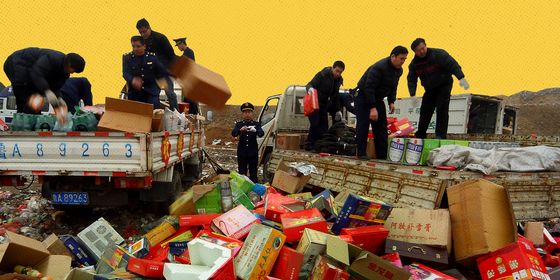From chemical rice to monstrous “water armies,” here are the most shocking consumer rights scandals revealed during China’s annual “3.15 Gala”
In this booming age of e-commerce, a common lament from online shoppers remains “the longest road I have traveled is the garden path merchants led me down (走过最长的路是商家的套路).” They know well fakes and bad deals lurk round every corner online. Yet however familiar one may be with underhanded sellers, it’s still a shock to see your own grandparents lured into spending their savings on snake oil.
Such scenes are presented annually on state broadcaster CCTV’s “3.15 Gala,” a TV program focusing on protecting consumer rights by exposing malpractices of unscrupulous companies. Since 1991, the gala has been held every year on March 15, World Consumer Rights day. Each year, the TV station sets up investigative teams to gather first-hand information by going undercover at suspected companies, then reveals their findings in one explosive program.
Some argue the one-day carnival doesn’t solve the root causes of consumer rights issues in China, and sheds light on gross misconduct by firms for one night only, before the news cycle quickly moves on. But others are happy to see dodgy businesses, large and small, brought to heel, even if just for one evening. Social media enables many particularly odious scandals to roll on for a long time online, keeping corporate PR teams busy for weeks.
In 2023, a year of recovery for business after three years of strict pandemic restrictions, 3.15 took a more sympathetic approach to enterprises. However, some of the disclosures still astonished the public:
Hired “water army” floods into live broadcasts to boost sales
Captured by CCTV’s camera, many thousands of mobile phones are placed in a room with their screens automatically swiping through live streams. Underneath every phone, there is a charging cable providing a constant flow of power, which makes sure the online “water army (水军)” remains afloat.
As the popularity of livestreaming grows, a monstrous industry providing clicks, likes, and shares for cash has emerged. Known as the “water army,” their troops crowd into livestreams and give fake likes and comments to the business accounts. Previously unknown accounts can quickly jump up the live charts on the platform with the greatest speed and lowest cost. “You can buy 100,000 likes with just 18 yuan, and 30 comments with 59 yuan,” one manager of the water army factory introduced to undercover reporters during the Gala.













